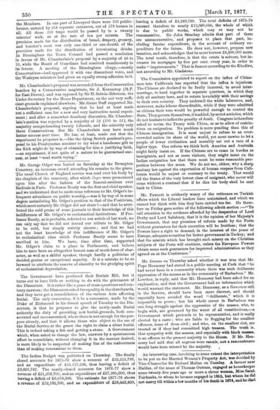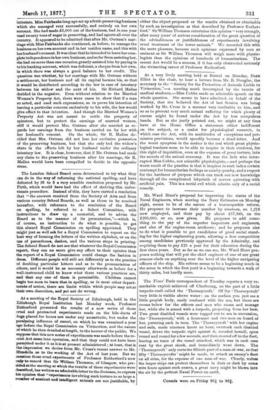An interesting case, involving to some extent the interpretation to
be put on the Married Women's Property Act, was decided by Vice-Chancellor Sir Richard Melina on Tuesday. A farmer near Halifax, of the name of Thomas Outram, engaged as housekeeper some twenty-five years ago or more a clever woman, Mime Sarah Fairbanks, to whom he became engaged in 1866, but whom he did not marry till within a few months of his death in 2874, and he died intestate. Miss Fairbanks long ago set up a fruit-preserving business which she managed very successfully, and entirely on her own account. She had made £6,000 out of the business, had in one year naafi twenty tons of sugar in preserving, and had agents all over the country. It appeared to be admitted that after Mr. Outram's mar- riage with Miss Fairbanks she continued, as before, to manage the business on her own account and in her maiden name, and this with her husband's oonsent. It was clear that he intended to leave her com- plete independence in her own business, and so far from assisting her, she had on more than one occasion greatly assisted him by paying in to his banking account, which was deficient, a cheque from her own, in which there was always a good balance to her credit. The question was whether, by her marriage with Mr. Outram without a settlement, her business and all its capital became his, so that it would be distributed according to the law in ease of intestacy between his widow and the next of kin. Sir Richard. Melina decided in the negative. Even without relation to the Married Women's Property Act, there were cases to show that if a man so acted, and used each expressions, as to prove his intention of leaving a particular concern exclusively to his wife, the law would give effect to that intention. And though the Married Women's Property Act was not meant to settle the property of spinsters, but to protect the earnings of married women, still it would protect Mrs. Outram after she married as re- gards her earnings from the business carried on by her with her husband's consent. On the whole, Sir R. Molina de- cided that Mrs. Ontram did not lose her exclusive possession of the preserving business, but that she only had the widow's share in the effects left by her husband under the ordinary intestacy law. It is clear, however, that if Mr. Outram had made any claim to the preserving business after his marriage, Sir R. Malins would have been compelled to decide in the opposite sense.



































 Previous page
Previous page